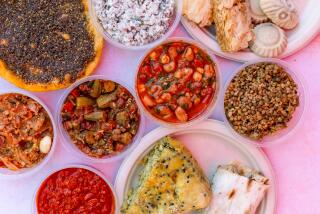Book review: ‘Eating Mud Crabs in Kandahar’
- Share via
When I reported in Africa and the Middle East, I often traveled with a small French press coffee maker and a stash of Toblerone chocolate in my duffle bag.
Food becomes enormously important in a war zone. In a besieged city like the Liberian capital, Monrovia, people would literally risk their lives for their next meal. But even in less dire circumstances, a good cup of coffee or a piece of dark chocolate can be a source of comfort amid the wretchedness of war.
Ask any foreign correspondent, and you will be regaled with tales of memorable meals. (Grilled bat, anyone?) Matt McAllester, who covered Kosovo, Afghanistan, Iraq and other conflicts while reporting for Newsday, did just that, collecting stories from British and American journalists.
“Eating Mud Crabs in Kandahar: Stories of Food During Wartime by the World’s Leading Correspondents” features the kind of yarns reporters tell one another when they get together at a favorite restaurant or bar. There are even recipes thrown in.
The title is taken from an essay by the Washington bureau chief for the Sunday Times of London, Christina Lamb. As a young correspondent, Lamb covered an earlier Afghan occupation and found herself pinned down in a trench by Soviet tanks with mujahedin fighters and a young Hamid Karzai, now the country’s president.
As the day wore on, they became increasingly hungry until one of the fighters found a mud crab and bit into it.
“Ratmullah offered one to me, but I shook my head,” Lamb writes. “I wasn’t sure how starved I would need to be to eat that.”
Food and the rituals of eating offer a window into both people and societies. At their best, these essays provide an intimate look at some of the personalities and places behind the headlines.
A piece by The Times’ Beijing bureau chief, Barbara Demick, describes North Korean leader Kim Jong Il’s passion for gourmet fare. Kim’s personal chef would fly to Iran and Uzbekistan to buy caviar, to Denmark for pork and to Japan to pick up a box of his favorite rice cakes.
“Of course, there is nothing wrong with being a foodie,” Demick writes, “except when you are the leader of a small, impoverished country where almost everybody else is eating grass.”
Rajiv Chandrasekaran, a senior correspondent and associate editor at the Washington Post, describes making a Christmas turkey in Baghdad, a seemingly impossible endeavor that becomes a metaphor for the fraught relationships and uneasy accommodations that have come to define the U.S. presence in Iraq.
In a searing account of the Rwandan genocide, writer and broadcaster Sam Kiley describes drinking tea that smelled of bodies. “No one I know who was in Rwanda then can eat roast pork or, worse still, fry chops — they smell of death,” he says.
In the age of embedded journalism, no collection about eating in wars would be complete without a chapter on MREs, or Meals Ready to Eat, the U.S. military rations also known as Meals Rejected by the Enemy, Meals Rarely Edible or Materials Resembling Edibles.
Tim Hetherington, who spent many weeks with troops at a remote outpost in Afghanistan to make the documentary “Restrepo” with Sebastian Junger, does the honors in a piece both humorous and poignant, especially since the author’s death earlier this year while covering the war in Libya.
These tales are as varied as their authors, which is part of the collection’s charm but also its weakness. While they are full of captivating detail, you get the feeling that some of the writers are stringing together anecdotes without much direction.
Still, if you’re the type of person who is curious about lives lived under extreme circumstances and the journalists who cover them, you’ll find stories to savor in “Eating Mud Crabs in Kandahar.”
More to Read
Sign up for our Book Club newsletter
Get the latest news, events and more from the Los Angeles Times Book Club, and help us get L.A. reading and talking.
You may occasionally receive promotional content from the Los Angeles Times.







